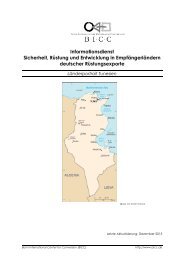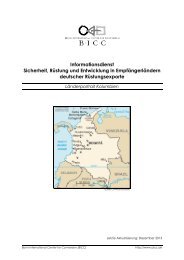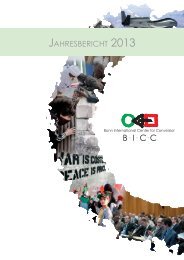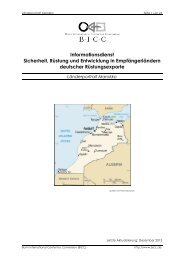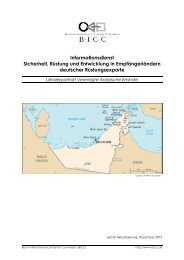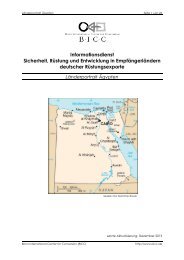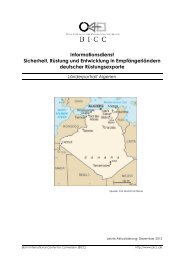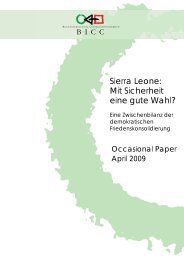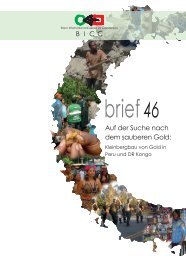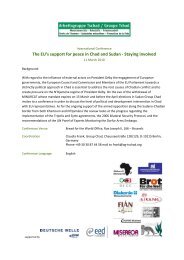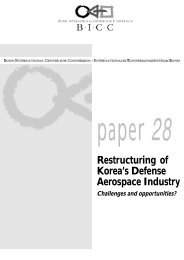English - BICC
English - BICC
English - BICC
You also want an ePaper? Increase the reach of your titles
YUMPU automatically turns print PDFs into web optimized ePapers that Google loves.
“Mr. Mayhew goes on to say ‘. . . the<br />
exploratory dialogue will be so we can discuss<br />
with Sinn Fein how the IRA will hand over<br />
their weapons’. So I say to myself: ‘This is<br />
what they want. They want the IRA to stop<br />
so that Sinn Fein can have the privilege 12<br />
weeks later, having been properly sanitised<br />
and come out of quarantine, to have<br />
discussions with senior civil servants of how<br />
the IRA can hand over their weapons’. And<br />
then I hear that reiterated again and again; by<br />
Douglas Hurd, by John Major, by Patrick<br />
Mayhew” (Irish News, 8 January 1994).<br />
However, even setting aside the fact<br />
that there had been no explicit<br />
reference to disarmament within the<br />
Joint Declaration, the picture is<br />
complicated by the absence of any<br />
mention of disarmament in the secret<br />
communications between the British<br />
and Sinn Fein during 1993. The British<br />
view was that disarmament was implicit<br />
in the secret communication of 5<br />
November 1993 in which it was stated<br />
that both sides would “examine the<br />
practical consequences of the ending<br />
of violence” during exploratory<br />
dialogue. For the British, this meant<br />
implementing measures to normalise<br />
security with the quid pro quo that<br />
Republicans would move on<br />
decommissioning (Irish Times, 15 July<br />
1995). The clarification of the Joint<br />
Declaration made by the British at Sinn<br />
Fein’s request in May 1994, reiterated<br />
this need to examine the “practical<br />
consequences” of any ceasefire in<br />
exploratory dialogue but again made<br />
no specific reference to disarmament.<br />
Although of necessity vague, it did<br />
throw into partial relief the<br />
choreography which Britain wished to<br />
see in the developing process. A<br />
“public and permanent” renunciation<br />
of violence, followed by a<br />
decontamination period of three<br />
months was necessary before entry<br />
into exploratory dialogue could take<br />
place. These preliminary negotiations<br />
would simply be a means to exploring<br />
the “basis upon which Sinn Fein would<br />
come to be admitted to an inclusive<br />
political talks process” (Irish Times, 20<br />
May 1994).<br />
Decommissioning had thus ceased to<br />
be flagged as an indicator of peaceful<br />
intent, but the door had been left open<br />
to its inclusion within exploratory<br />
dialogue. This clarification by the<br />
British hardened and elongated the<br />
provisions in paragraph 10 of the Joint<br />
Declaration to a degree, but the Irish<br />
government, for its part, expressed its<br />
satisfaction with the British response to<br />
Sinn Fein (Bew and Gillespie, 1996, p.<br />
53). The British government appears<br />
then to have been speaking in different<br />
tones on different occasions regarding<br />
the matter of decommissioning. In the<br />
period around the issuing of the Joint<br />
Declaration, the necessity of<br />
disarmament was publicly voiced, but<br />
in private communications with Sinn<br />
Fein, omitted. The picture is<br />
complicated further by the fact that the<br />
British government and Sinn Fein<br />
published differing accounts of these<br />
contacts. Five months after the<br />
Declaration was unveiled, the British<br />
publicly clarified their understanding<br />
of its provisions, again omitting an<br />
explicit reference to disarmament but<br />
skilfully leaving the way open to its<br />
introduction. It was a card placed up<br />
the sleeve, but one that Republicans<br />
knew they possessed.<br />
The initial<br />
Republican response<br />
Irish Republicans, of course, regarded<br />
any suggestion that disarmament might<br />
be a necessary test of democratic<br />
fitness as anathema. This did not mean<br />
that they were altogether shy in<br />
discussing the matter in the pre- and<br />
immediately post-ceasefire period.<br />
However, in their view it was best seen<br />
in a much wider context, one of<br />
“demilitarisation” and a matter that<br />
would be resolved as a part of the<br />
process rather than a condition of<br />
entry to it. As Adams made clear in the<br />
months before the Declaration, he<br />
wanted a process to develop that would<br />
“see an end to the IRA”, indeed for<br />
some time Sinn Fein’s policy had been<br />
B·I·C·C<br />
origin of the issue<br />
“. . . total demilitarisation. We want to see<br />
all the forces in the conflict setting aside their<br />
weapons—right now, today. What we’re<br />
involved in is an initiative which will hopefully<br />
lead to a process. As that develops the various<br />
armed forces—crown forces, loyalist,<br />
republican—will see fit, at a time of their<br />
own choosing to demilitarise” (Belfast<br />
Telegraph, 22 October 1993).<br />
In the days following the ceasefire,<br />
Adams again reiterated the belief that<br />
“there must be a process of<br />
demilitarisation” and that the task<br />
before the actors was to “create a<br />
climate so that all engaged in armed<br />
action” would be “demilitarised” (Irish<br />
Times, 2 September 1994), but he did<br />
not see the issue of the handing over<br />
of IRA weapons as a “stumbling block<br />
on the way to peace” and pointed to<br />
the fact that most of the guns in the<br />
conflict lay in the hands of the British<br />
Army. Martin McGuinness, who was to<br />
become Sinn Fein’s leading negotiator<br />
in the peace process, expressed<br />
optimism that “a total demilitarisation”<br />
could be brought about quickly (Irish<br />
Times, 3 September 1994).<br />
Aside from public pronouncements,<br />
Sinn Fein are reported to have given<br />
tacit assurances to the Irish<br />
government that the issue of weaponry<br />
would have to be dealt with and that<br />
paramilitary guns would have to be<br />
“banjaxed” [destroyed] (Duignan, no<br />
date, p. 151). As Albert Reynolds was<br />
to recollect in his dealings with<br />
Republicans at that time, he was<br />
assured that in return for not pressing<br />
the matter or prior disarmament,<br />
decommissioning “implicitly going<br />
beyond the approach of the ‘pike in<br />
the thatch’ would be dealt with during<br />
the process of reaching a negotiated<br />
settlement” (Irish Times, 9 December<br />
1995).<br />
Disarmament was clearly a matter that<br />
Republicans realised they would have<br />
to face up to at some stage in the<br />
process, but not one which they<br />
believed should be used as a tollbooth<br />
supervising entry to political talks.<br />
13



